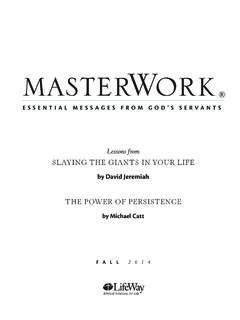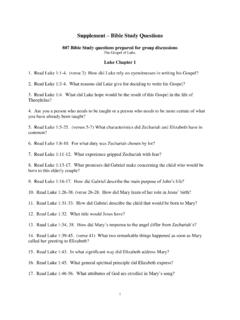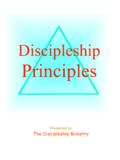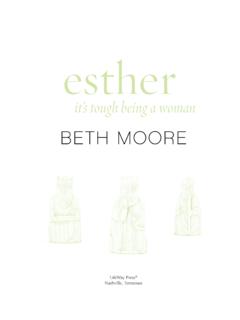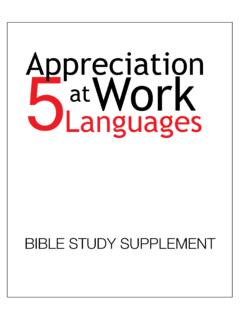Transcription of Paul's Letter to the Galatians
1 Paul's Letter to the Galatians Living in line with the truth of the gospel (Gal 2:14) Leaders' Guide Tim Keller Redeemer Presbyterian Church Copyright 2002 How to Use this Material This study of Galatians is organized into 13 units. Each unit consists of two sections: 1) a bible study and 2) a Reflection or Exercise section. The first section studies a portion of the Galatians text, while the second section takes some concept from the Scripture and helps you get a better understanding of it ("Reflection") and/or to apply it practically to your life ("Exercise"). There are three ways to use this material to grow in Christ. I will list the ways in ascending order of profitability and helpfulness. An individual could use this workbook by first buying a popular commentary. I suggest John Stott, The Message of Galatians , The bible Speaks Today Series. (Downers Grove: Inter-Varsity Press, 1968). Then, reading both the Galatians text and the commentary, go through the whole workbook yourself.
2 An informal mini-group of two or three people could also decide to do this together. In this case you should buy the Stott commentary and go through the workbook, meeting periodically simply to share the most important things you have been learning. This is much better than the first approach, because it injects a level of accountability and community into your study . A home fellowship group with an equipped leader is by far the best context for the use of this workbook. A life changed by the Gospel happens best in a balanced community of worship and friendship as well as study . The concepts in this material are life-changing but take a great deal of reflection in order to grasp them. They will be grasped much better in a small group community that meets regularly. If you want to truly understand and grow through the material in this workbook--get thee into a home fellowship group! Leader's notes: How to Use this Material Materials This study of Galatians includes 1) a workbook for every participant and 2) a leader's guide (which you are reading) for the group leader and any co-leaders or apprentices.
3 The workbook contains 13 units, each with a bible study section and a Reflection or Exercise section. The Leader's Guide includes all that is printed in the workbook and also leader's background notes (on the Biblical texts) and suggested answers to all the Biblical study questions. Planning your Weekly Session The material assumes that a group has two hours to meet. (If you do not have that amount of time the leader must adapt what is here.) In order to give enough time for worship, sharing, and prayer, don't let the bible study and Reflection/Exercise (combined) go more than 1 hour at the most. Forty-five minutes would be better. In general, there is more material in these 13 units than a small group can cover every week. This leads to the following important guidelines: If you really want to cover everything: All group members must read the Reflection/Exercise and write out their answers to the questions before they come to the meeting. The more studious groups could also read the Galatians text and fill in answers to the bible study questions.
4 You can then give the majority of the time to discussing the Galatians text using the bible study questions. After that you can more briefly share and discuss the best things each person got out of the Reflection/Exercise during the week. Occasionally you can reverse this. You may give less time to the bible study and more time to the Reflection/Exercise. In any case, prep must be completed beforehand if you want to touch every part of the material in your group meetings. Another way to cover all the material is to take more than 13 sessions to get through it. If your group cannot make the commitment to prior preparation: Each week the leader should choose to focus on either the bible study or the Reflection/Exercise. If on a given week you opt for the bible study , you should use the study questions to lead the discussion and then encourage the participants to do the Reflection/Exercise on their own. You may wish to summarize what it is about, pointing out how it fits in with what the Galatians text has been teaching.
5 If you opt to focus on the Reflection/Exercise, you may briefly read the Biblical text for the week and summarize it. Then you can have participants read aloud parts (if it is long) or all (if it is short) of the weekly Reflection/Exercise and use the questions to stimulate and guide the discussion. The following Exercise/Reflection sections are probably the most important. Keep these in mind as you plan your studies. Lesson 1 - Reflection: Luther's Preface to Galatians Lesson 3 - Reflection: The Two Prodigals Lesson 4 - Exercise: "In Line" with the Gospel Lesson 5 - Reflection: Grace and Growth (Lovelace excerpt) Lesson 6 - Exercise: Deeds. Words and Heart Lesson 8 - Exercise: Idols of the Heart Lesson 10 - Exercise: Son or Slave? Preparing for the bible study . Both the Workbook and the Leader's Guide use the New International Version (NIV) translation of the bible . With minor adaptations the group could use other translations. The written study questions are only the starting point for the leader and the group.
6 It is best for the leader to prepare for the session as follows: Answer the questions yourself from the Biblical text. Write down your own answers in a workbook before looking at the Leader's Guide. Then supplement and revise your answers in light of the suggested answers. Finally, it is important to customize and adapt the questions. You know your self and your group. You know which questions might be too difficult and/or uninteresting to them. You may see other themes in the text you want to bring out. So prepare your own questions. Redeemer provides good tools in the Fellowship Group Manual for preparing excellent discussion questions. Paul's Letter to the Galatians Lesson 1 - The Uniqueness of the Gospel Galatians 1:1-9 Reflection: Luther's Preface to Galatians Lesson 2 - A Gospel-Changed Life Galatians 1:10-24 Exercise: Testimony Lesson 3 - Unity in the Gospel Galatians 2:1-10 Reflection: The Two Prodigals Lesson 4 - Living the Gospel Galatians 2:11-21 Exercise: "In Line" with the Gospel Lesson 5 - The Gospel and Faith Galatians 3:1-14 Reflection: Grace and Growth Lesson 6 - The Gospel and the Law Galatians 3:15-25 Exercise: Deeds, Words and Heart Lesson 7 - Children of God Galatians 3:26-4:7 Reflection: Adoption in Christ Lesson 8 - Gospel-Centered Ministry Galatians 4:8-20 Exercise: Idols of the Heart Lesson 9 - Grace to the Barren Galatians 4:21-31 Exercise: Gospel Forgiveness Lesson 10 - Gospel Freedom Galatians 5:1-15 Exercise: Son or Slave?
7 Lesson 11 - Gospel Character Galatians 5:16-25 Exercise: Fruit of the Spirit Lesson 12 - Gospel Relationships Galatians 5:26-6:5 Exercise: Gospel Relationships Lesson 13 - Sowing and Reaping Galatians 6:6-18 Reflection: Luther Re-visited Introduction to Galatians Historical Setting of the Letter to the Galatians The apostle Paul was a church-planting missionary. After he planted a church and left a region, he continued to supervise new congregations through his letters. One of these letters is this Epistle to the Christian churches in the area of Galatia in Asia Minor. Most scholars agree that this Letter was written by Paul around 50 (only 15-20 years after the death of Christ). It is helpful to recognize the following three things from the historical setting which will help us understand this epistle: This Letter addresses a social and racial division in the churches of Galatia.
8 The first Christians in Jerusalem were Jewish, but as the gospel spread out from that center, increasing numbers of Gentiles began to receive Christ. However, a group of teachers in Galatia were now insisting that the Gentile Christians practice all the traditional Mosaic ceremonial customs as the Jewish Christians did. They taught that the Gentiles had to observe all the dietary laws and be circumcised for full acceptance and to be completely pleasing to God. Although this specific controversy may seem remote to us today, Paul addressed it with an abiding, all-important truth. He taught that the cultural divisions and disunity in the Galatian churches were due to a confusion about the nature of the gospel. By insisting on Christ-plus-anything-else as requirement for full acceptance by God, these teachers were presenting a whole different way of relating to God (a different gospel 1:6) from the one Paul had given them ( the gospel I preached 1:8). It is this different gospel that was creating the cultural division and strife.
9 Paul forcefully and unapologetically fought the different gospel because to lose one s grip of the true gospel is to desert and lose Christ himself (1:6). Therefore, everything was at stake in this debate. The most obvious fact about the historical setting is often the most overlooked. In the Letter to the Galatians , Paul expounds in detail what the gospel is and how it works. But the intended audience of this exposition of the gospel are all professing Christians. It is not simply non-Christians, but believers who continually relearn and reapply the gospel to their lives. The Abiding Importance of the Gospel It is very common in Christian circles to assume that the gospel is something just for non-Christians. We presume that the gospel is a set of basic A-B-C doctrines that Christians do not need to hear or study once they are converted. Rather, they should move beyond the gospel to more advanced doctrines. But the great declaration of the gospel of grace in Galatians was written to believers who did not see the implications of the gospel for life-issues confronting them.
10 Paul solves the disunity and racial exclusivity not with a simple exhortation to be better Christians. but by calling them to live out the implications of the gospel. So Christians need the gospel as much as non-Christians do. Their problems come because they tend to lose and forget the gospel. They make progress only as they continually grasp and apply the gospel in deeper ways. The gospel shows us that our spiritual problem lies not only in failing to obey God, but also in relying on our obedience to make us fully acceptable to God, ourselves and others. Every kind of character flaw comes from this natural impulse to be our own savior through our performance and achievement. On the one hand, proud and disdainful personalities come from basing your identity on your performance and thinking you are succeeding. But on the other hand, discouraged and self-loathing personalities also come from basing your identity on your performance and thinking you are failing. Belief in the gospel is not just the way to enter the kingdom of God; it is the way to address every obstacle and grow in every aspect.


